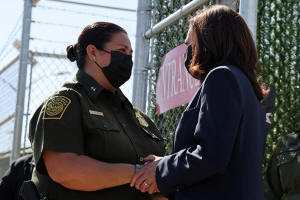Republicans call Harris a failed border czar. The truth is more
complicated
 Send a link to a friend
Send a link to a friend
 [July 30, 2024]
By Ted Hesson, Mica Rosenberg and Kristina Cooke [July 30, 2024]
By Ted Hesson, Mica Rosenberg and Kristina Cooke
WASHINGTON - Vice President Kamala Harris, tasked to deal with the root
causes of migration from Central America as illegal border crossings
were rising in 2021, immediately ran into the enormity of the mission.
The region is riddled with corrupt government officials, the drivers of
migration are deeply rooted in economic inequality and social factors -
and she didn't control the border.
"She was given a very hard, difficult, convoluted portfolio," said U.S.
Senator Chris Murphy, a Democrat on the Foreign Relations Committee and
an architect of a bipartisan border security bill introduced earlier
this year.
At campaign rallies and in social media posts, Republican presidential
candidate Donald Trump has intensified his attacks on Harris as a failed
"border czar," especially now that she has emerged as the likely
Democratic nominee after President Joe Biden ended his campaign for
reelection this month.
Despite Harris' efforts, some 7 million migrants have been arrested
illegally crossing the U.S.-Mexico border under Biden, according to
government data, all-time highs that have fueled Republican criticism.
The reality of Harris's record on migration is far more complicated,
according to interviews with three current Biden officials, 13 former
officials and others tracking the issue.
First, Harris was never given the portfolio of border czar, said Alan
Bersin, who embraced the label as a special representative for border
affairs under Presidents Barack Obama and Bill Clinton. "This was not
the job assigned to VP Harris," he said.
Instead, Biden asked Harris to lead diplomatic efforts to reduce
poverty, violence and corruption in Central America's Northern Triangle
countries of Guatemala, Honduras and El Salvador, as well as engage with
Mexico on the issue.

It was similar to the job Biden had when he was vice president.
But that was an overly broad mission, Murphy said.
"It's hard in a short period of time to come up with a strategy that
impacts the very real and complicated psychological decision-making that
people in those countries go through when they're deciding to come to
the United States," Murphy said in a phone interview.
And within months of Harris taking the job, the focus on the three
Central American countries was out of step with the reality at the
border - where illegal immigration from Cuba, Haiti, Nicaragua and
Venezuela was spiking, several former officials and outside experts
said.
"She started off, in a sense, at a disadvantage because everyone was
focusing on those three countries in the Northern Triangle," said
Roberta Jacobson, who served as a coordinator for the U.S.-Mexico border
in the early months of the Biden administration. "Meanwhile, the migrant
population was changing dramatically."
Harris continued to lead the Central America effort although she has
increasingly focused on abortion rights this year, a top Democratic
issue since a 2022 U.S. Supreme Court decision struck down the
nationwide right to an abortion.
The White House said in March that Harris helped engineer $4 billion in
government aid and commitments of $5.2 billion in private investment to
create or support an estimated 250,000 jobs in Guatemala, Honduras and
El Salvador.
Nespresso started sourcing coffee from El Salvador and Honduras in 2021.
Gap Inc said it is on pace to meet a pledge to invest $150 million by
2025 to source textiles in the region and that it had increased yarn
production in Guatemala and provided skills training to women in
Guatemala and Honduras.
Ricardo Barrientos, director of the Central American Institute of Fiscal
Studies think tank, said the U.S. aid and private sector investment was
a fraction of the remittances migrants from the three countries working
in the U.S. send home each year – $37 billion last year alone.
"It's very small compared to the magnitude of the challenge," he said.
"Or some would say, 'too little, too late.'"
By May, the number of migrants from the Northern Triangle caught
crossing illegally had fallen to 25,000 from a peak of 90,000 in July
2021 - although experts say the impact of Harris' efforts remain
unclear.
'BORDER CZAR'
Harris made two trips to Central America: Guatemala in June 2021 and
Honduras in January 2022. That was one fewer than Biden, who made three
trips to Guatemala after he was assigned a similar role in 2014.
[to top of second column]
|

U.S. Vice President Kamala Harris speaks with Gloria Chavez, Chief
Patrol Agent of the El Paso Sector, as she visits El Paso central
processing center in El Paso, Texas, U.S., June 25, 2021.
REUTERS/Evelyn Hockstein/File Photo

Meanwhile, Republicans began identifying Harris with rising illegal
crossings and called on her to visit the border. She made her first
and only visit to U.S. border operations in El Paso, Texas, in June
2021, where she defended her portfolio.
"The reality of it is that we have to deal with causes, and we have
to deal with the effects," she told reporters at the airport.
During the six-hour visit, Harris toured a migrant processing
center, speaking with a group of girls, her office said at the time.
But she did not tour the border wall on foot, according to pool
reports, which Trump officials did routinely.
Raul Ortiz, the Border Patrol chief from 2021-2023, said he never
spoke with Biden or Harris although he met with Trump and then Vice
President Mike Pence more than once despite holding a lower rank
during that administration.
"I would have liked to have had an opportunity to discuss some of
the issues and some of the recommended changes that I thought we
should have implemented," Ortiz said.
The White House said in March that Ortiz had been invited to join
Biden in El Paso last year and did not attend, although Ortiz
contested that, saying he was not invited.
LIABILITY OR ASSET
Immigration is the third-highest concern of U.S. voters behind the
economy and extremism, according to a Reuters/Ipsos poll in June,
and voters favored Trump's approach to immigration over Biden's
44%-31%.
In an attack ad rolled out on July 25, the Trump campaign portrayed
Harris as a liberal who was soft on crime and in favor of "open
borders." The ad highlighted years-old Harris comments saying people
who cross the border illegally should not be considered criminals,
and that the U.S. should "probably think about starting from
scratch" when it comes to immigration enforcement.
"If border czar Harris stays in charge, every week will bring a
never-ending stream of illegal alien rapists, bloodthirsty killers
and child predators to go after our sons and our daughters," Trump
said at a rally in North Carolina last week.
The Harris campaign in a statement to Reuters portrayed Trump as an
extremist whose administration separated thousands of migrant
families and who helped sink the bipartisan border security bill in
the U.S. Senate - messaging in line with Biden's approach over the
past year.
"There's only one candidate in this race who will fight for real
solutions to help secure our nation's border, and that's Vice
President Harris," campaign spokesperson Kevin Munoz said in a
statement.
Some immigration advocates hope that Harris - herself the daughter
of Indian and Jamaican immigrants - would better understand the
humanitarian side of the issue.

Harris was instrumental in the Biden administration's rollout of a
program in June to offer a path to citizenship to immigrants in the
U.S. illegally who are married to U.S. citizens, two people familiar
with the matter said.
Daniel Suvor, Harris' chief of policy between 2014 and 2017 when she
was California attorney general, pointed to her efforts to marshal
legal representation for unaccompanied immigrant children - even
though immigration was not explicitly part of her portfolio.
She took it on herself to learn about the application process for
special visas for victims of abuse, Suvor said. And she teamed up
with Brad Smith, then the general counsel for Microsoft and
co-founder of the advocacy group Kids in Need of Defense, and
started calling law firms.
(Reporting by Ted Hesson in Washington, Mica Rosenberg in New York
and Kristina Cooke; Additional reporting by Trevor Hunnicutt in
Washington; Diego Ore in Mexico City and Sofia Menchu in Guatemala
City; Editing by Suzanne Goldenberg)
[© 2024 Thomson Reuters. All rights
reserved.]This material
may not be published, broadcast, rewritten or redistributed.
Thompson Reuters is solely responsible for this content. |